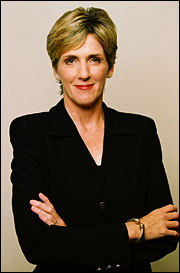
It’s looking increasingly likely that Carol Browner will be tapped to serve as “energy czar” in the Obama administration. The Washington Post first reported it Tuesday night, and now other outlets have gotten similar word from inside sources. No official word from the transition staff, however.
The position does not yet officially exist, but it’s envisioned as a new role that would help prioritize and coordinate energy and climate work across the various departments and agencies of the federal government. Browner would work closely with the White House, though it isn’t clear yet whether it would a Cabinet-level post. It’s also not yet clear whether Obama might create a new National Energy Council, as recommended by the Center for American Progress; if he does, it’s assumed his new energy czar would run it.
Only she might not actually be called an energy czar. Politico reports that the Obama team doesn’t like the term “czar,” and Browner made fun of the word “czarina” last week.
Browner was head of the U.S. EPA during the entire Clinton administration, making her the longest-serving administrator in the agency’s history. She took the reins in 1993, when she was just 37. Prior to that, she served as Florida’s secretary of the environment from 1991 to 1993, and was a top aide to Al Gore when he was in the Senate.
Since leaving the EPA in 2001, Browner has served as a principal in The Albright Group LLC, a global strategy firm lead by former Secretary of State Madeline Albright. She’s also a principal of Albright Capital Management, an investment advisory firm that concentrates on emerging markets. Browner is currently chair of the board of the National Audubon Society and a member of the board of directors of the Alliance for Climate Protection and the League of Conservation Voters. She also serves on the board of APX, a company that provides infrastructure for environmental and energy markets.
Much of Browner’s time at the EPA was spent beating back attempts by Newt Gingrich and congressional Republicans to weaken the Clean Water Act and other environmental laws, yet she also racked up some notable progress during those eight years. Under her tenure, EPA issued new air-pollution control rules for diesel fuels, cutting sulfur content by 97 percent, and enacted stronger emissions limits on diesel engines. The agency updated federal standards for particulate matter and ozone, better-known as “soot” and “smog,” respectively. In 1994, Browner oversaw the expansion of the Toxic Release Inventory, nearly doubling the number of chemicals whose emissions must be reported to the public.
She was a key figure in enacting rules to strengthen the Safe Drinking Water Act in 1996 and the Food Quality Protection Act in 1997. In 1999, two pesticides that cause nervous system damage and other problems were banned under her watch, though environmentalists criticized her for not outlawing some of the most dangerous chemicals and accused her of bowing to industry pressure.
Browner was unsuccessful in her efforts to rally support for legislative reform of the Superfund program, but she was able to accelerate the pace of Superfund-site cleanups, completing 400 in the administration’s first term.
Browner’s leadership at EPA generated plenty of controversy among folks who don’t care for regulation. The Stump brings us the condensed version:
When Clinton tried to elevate her EPA post to the Cabinet, Republican lawmakers put up a fight, arguing that she advocated for overly restrictive environmental regulations that were bad for business interests. In 1995, under her watch, congressional leaders from both parties accused the EPA of violating the Anti-Lobbying Act by faxing documents opposing a Republican-backed regulatory reform package to interest groups. When, in 1997, she successfully pushed for tougher clean air regulations, the Orlando Sentinel reported that many lawmakers thought she was difficult to work with. “The nation’s mayors are unhappy. Chicago’s Richard Daley and others have said the new limits could quash economic development in inner cities,” the article said. The Philadelphia Inquirer reported that thousands protested the decision in letters to Browner, including one that read, “Take your proposed new clean-air standards and shove them, you Commie. … If you would like authoritarianism, get the hell out of my country and go to Russia where you’ll fit right in.”
Browner was an early supporter of Hillary Clinton in the Democratic primaries, but later campaigned for Obama at events sponsored by the League of Conservation Voters. Since Obama’s election, she has been leading the transition team’s energy and environment policy working group. As one might expect, she’s been highly critical of President George W. Bush, saying he’s run the “worst environmental administration ever.”


